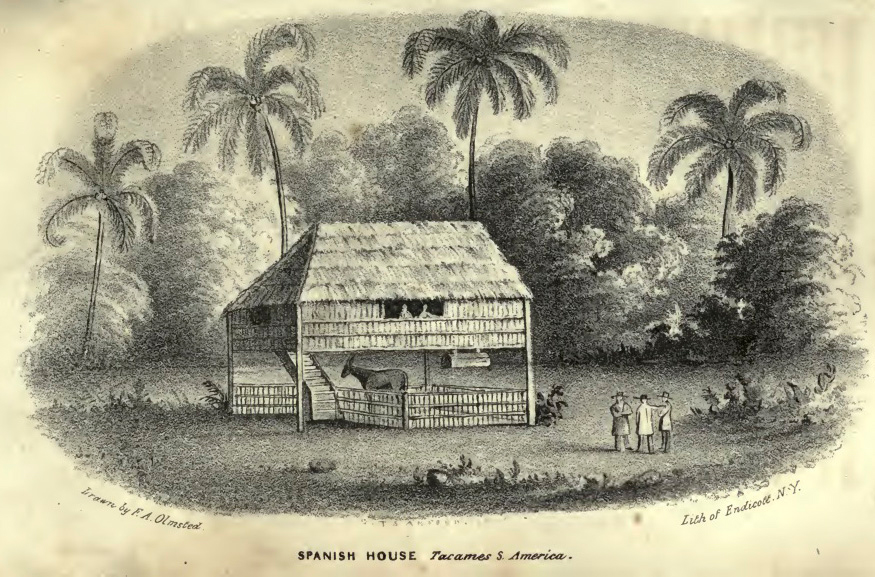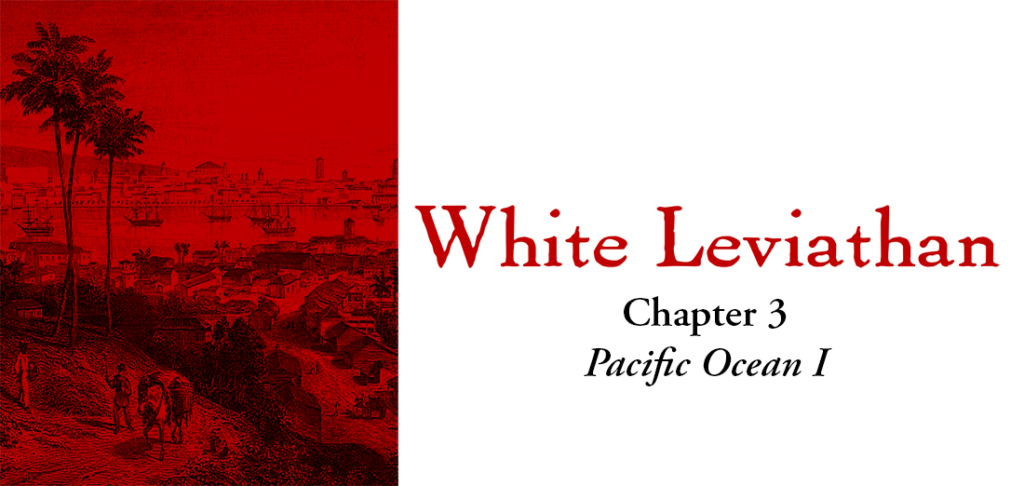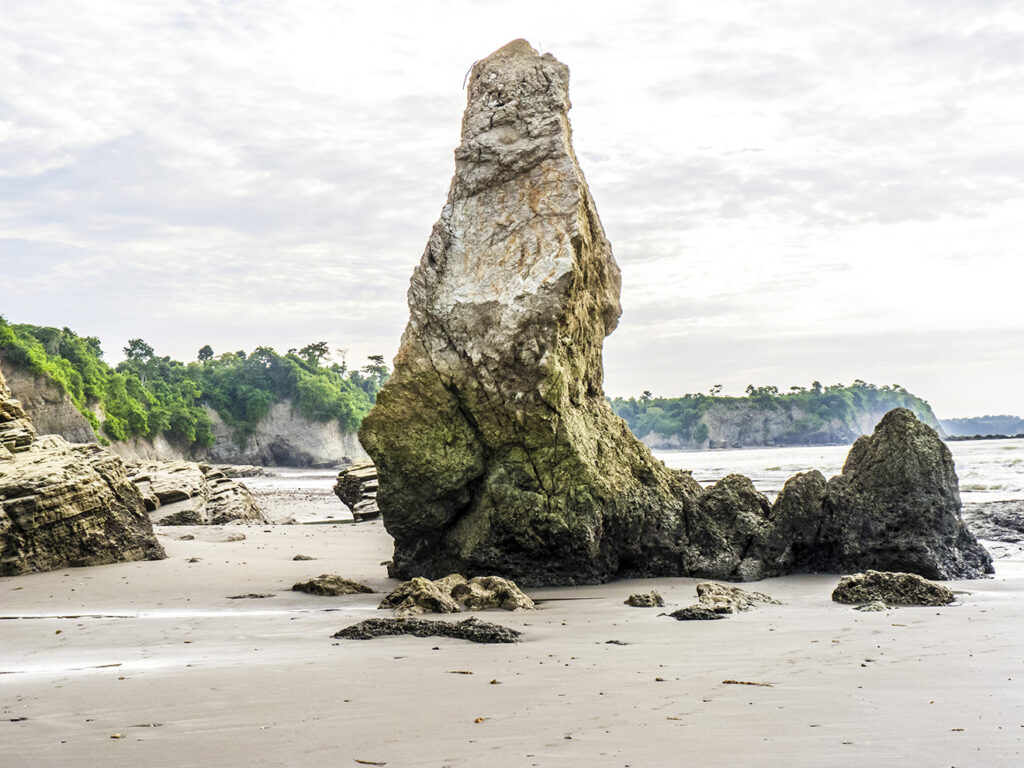Pacific Ocean I: Atacames
- At October 27, 2022
- By Great Quail
- In White Leviathan
 0
0
I could not but admire the exuberant growth of every thing belonging to the vegetable kingdom The most delicious pine apples spread out before us, while the cocoanut tree, the plantain and the banana waved their broad leaves gracefully in the breeze. Here were oranges, limes and other fruits lying scattered around in neglected profusion. The fig trees had also begun to put forth, and the indigo plant grew spontaneously like the most common weed. […] When the bananas, plantains, and other fruits were suspended upon deck and from aloft, the ship looked as if she had been dressed off with evergreens for some festive occasion, while the cabin and state rooms were full of the finest oranges, limes, pine apples and cocoanuts.
—Francis Olmsted, “Incidents of a Whaling Voyage”
11) Atacames
Ecuador, May 26-29, 1845
A) Santa Rosa de Atacames
Atacames is a small Ecuadorian village occasionally visited by sailors in need of provisions. The location of Pizarro’s second landing, Atacames—officially Santa Rosa de Atacames, but universally known to Yankees as “Tacames”—is located one degree above the equator, and is part of the Esmeraldas Province, a verdant rainforest centered on the Río Esmeraldas. The village is fronted by a long, sandy beach marked by several prominent rock formations. The Río Atacames is above the village, twisting down from the forested hills and running north before spilling over the beach.
B) ¡Bienvenido a la Jungla!
Atacames is home to thousands of strange and wonderful creatures. Pelicans strut along the shore, and scarlet-colored land crabs scurry through the sandy undergrowth. The trees are alive with flickering lizards and exotic birds. Deeper in the jungle, one finds sloths, anteaters, wild turkeys, and translucent glass frogs. The river is prowled by jaguars, called “South American Lions” and greatly feared by sailors who venture too far from shore. Like all jungles, there’s also an abundance of vermin: poisonous snakes, centipedes, and tarantulas, not to mention an inexhaustible population of mosquitos and sand fleas!
Cornucopia
To a hungry sailor, Atacames offers many culinary delights—bananas, plantains, limes, oranges, pineapples, and coconuts are plentiful and cheap. The village is famous for its skilled fishermen, and oysters and shellfish are common fare. A local favorite is ceviche, raw fish cured with lime juice and chili peppers. Orange juice, coconut water, and lemonade provide ample refreshment, but there’s also plenty of rum and aguardiente, an alcoholic beverage made from fermented sugar cane.
C) The People
The population of Atacames numbers five hundred Spanish, Indians, mestizos, and Afro-Ecuadorians. Most of the villagers live in bamboo and thatch huts, elevated above the earth on 8-10 foot stilts. Not only does this raise them above the copious sand fleas, it protects them from stray jaguars. There are no cantinas or tiendas at Atacames—just a wooden chapel with a few rickety benches and woven mats, the altar covered with spermaceti candles.
 “Spanish House” at Atacames, Francis Olmsted, 1841
“Spanish House” at Atacames, Francis Olmsted, 1841
Politics
Atacames is a comfortable distance from the turbulent capital of Ecuador, and is governed by an “Alcalde”—a well-to-do magistrate who lives on a small inland plantation. As with much of South America, the population of Atacames is sorted into traditional Spanish racial categories. Most of the decisions are made by Spanish families, who own the majority of the land, along with the domesticated animals such as dogs, chickens, and donkeys. Below them are the mestizos, mostly descended from the Incas. The lowest rungs of the social ladder are occupied by Afro-Ecuadorians, including Negroes, mulattos, and zambos, the latter denoting persons of African/Indian ancestry. Many Afro-Ecuadorians descended from slaves who escaped into the jungles in the sixteenth century, some from crashed slave ships. While the local vocabulary has absorbed a few fragments of Kichwa, Spanish is the dominant language, and few villagers speak English.
D) Schedule: Atacames, May 26-29
Captain Joab intends to stay at Atacames for three days. May 26 is a general work day for the entire crew. On May 27, Mr. Coffin’s starboard watch will be granted liberty, switching places with Mr. Whipple’s larboard watch the following day. Dixon, Morgan, Dr. Lowell, Quakaloo, and Rachel may spend their time as they see fit. Although Joab plans to weigh anchor the morning of May 29, an incident with third mate Whipple and his crew is destined to cast a gloom over their departure…
E) May 26: The Watering Expedition
One of the Quiddity’s first tasks is to obtain fresh water. A raft is constructed and loaded with empty water butts, each with a capacity of 126 gallons. Two whaleboats are required to tow this raft up river and obtain fresh water. Joab places Mr. Coffin in charge of the expedition—“Take ten good men, and keep an eye on them! They can skylark once the work is done.”
Widely considered a “plum pudding” assignment, the most difficult part of the chore is fighting the surf to reach the mouth of the Río Atacames. The breakers along the beach can be ferocious, and incautious sailors are rewarded with a swamped whaleboat. A couple of Pilot Boat rolls avoids this messy fate. (These same beakers will one day make Atacames a celebrated surfing destination.)
Once the boats reach the river, the crew breathes a sigh of relief and relaxes into the gorgeous day. The sun is shining, the temperature’s a mild 76°, and the air is scented with citrus. The river winds through the jungle, its water a deep, earthy brown. An occasional orange or lemon floats on the lazy current. A few local children run along the riverside, calling to the sailors in Spanish—“¡Hola gringos—mis hermanas quieren conocerte, ja ja ja!” One of them tosses a bunch of bananas into a boat and laughs—“¡Sólo tres centavos, puedes pagarme más tarde!” Here and there huts crowd the riverbank, their stilts driven into the mud.
Eventually the boats reach the shallows a mile or two inland and the men take turns filling the butts. A few Spanish women descend from riverside shacks, cigars clenched in their teeth and trays of fruit balanced on their turbaned heads. One carries a clay pitcher of lemonade. Despite Joab’s warning, it’s up to Mr. Coffin whether to allow the men to socialize. Although the women come across as flirtatious, they’re only selling overpriced cigars, fruits, and pots of ceviche. One señorita plays a guitar, while another produces a wicker cage crowded with squawking parrots—“¿Te gustaría comprar un loro? a los marineros les gustan los loros!” Filling the casks takes a few hours, after which the boats escort the raft downriver and re-negotiate the breakers.
Back on the Quiddity
Once Mr. Coffin has departed with the watering expedition, Captain Joab dispatches Mr. Whipple to invite the Alcalde onboard for negotiations; whale oil, iron hoops, and Kingsport dry goods are traded for generous amounts of fruit, seafood, and tobacco. The village padre requests an audience, offering services for any católicos and inviting them to a special mass at la capilla on shore. Any player character making a Psychology roll notices that Padre Hugo seems unnerved by Mr. Pynchon. If he’s asked the reason in Spanish, he declares, “Hay algo en él que no me gusta…”
F) Rachel and Tacames
Rachel will be treated like a queen by the señoras of Atacames, who fuss over her condition like industrious hens. The Alcalde and his wife may even take interest, offering Rachel a place to sleep at their plantation and killing a chicken in her honor. The fact Rachel speaks Spanish delights the villagers, and she’s offered an endless stream of advice on childbearing and motherhood.
La Nodriza
If the Keeper and Rachel’s player desire, Atacames is an excellent place for Rachel to acquire a nodriza, or wetnurse. However, this option is only available if Rachel has developed a positive relationship with Captain Joab. If that’s the case, and Joab welcomes the birth of his son, he’ll grudgingly allow another woman onboard. However, if their relationship is antagonistic, Joab forbids Rachel this convenience—“Nurse the child yourself, woman, like the Good Lord intended.” If the Keeper and Rachel’s player decide a wetnurse is a viable option, the Keeper may create a new NPC to fill the role. Going to sea in a cramped henhouse is not a very attractive position, so the most likely candidates are mestizas and zambas. However, there might also be a heartbroken young madre who lost her husband and child, or a disgraced puta from Esmeraldas or Salinas.
G) Liberty: May 27-28
Liberty at Tacames is a more subdued affair than Vallipo. Enterprising locals are willing to trade food and rum for coin, but most of the Quids spend their time stretching their legs and gathering “cocoa-nuts” and “pine apples,” to use the contemporary spellings for these exotic treats. Joab authorizes use of the ship’s blunderbuss to hunt for turkeys and pelicans.
May 27: Starboard Watch
The first night of shore leave, rough seas prevent a safe return to the Quiddity. The men are happy to spend their night ashore, lighting a bonfire and drinking aguardiente. They’re joined by locals, who sell them thin sheets of calico, “para los mosquitos.” For those who can afford a few reales, they may rent lodgings among the families, sleeping on reed hammocks slung under calico canopies. Whether a sailor spends his night ashore or elevated in a hut, his rest is anything but peaceful, the sound of dogs and donkeys competing with unsettling howls emanating from the jungle. The sand fleas are atrocious, and the mosquitos invariably penetrate the calico to enjoy their feast of blood. The morning brings calmer weather, and Mr. Coffin’s watch returns to the ship with little effort.
May 28: Larboard Watch
By the time the larboard watch drags their boats ashore, it’s clear the weather is changing. The refreshing sea-breeze falters and fails, bringing a rare, airless humidity. The temperature climbs to 82°C. This doesn’t seem to faze Whipple and his cronies, who seem in exceptionally high spirits. Around noon, the third mate gathers his most trusted men and announces a “hunting expedition” upriver. Mr. Pynchon hands him the musket reluctantly— “I trust you’ll make a timely return, and bring your minions back safely? And Mr Whipple, a fat turkey for the officer’s mess would be splendid.” The moment Pynchon’s out of earshot, Whipple laughs sardonically, “Minions! Hear that, boys? I have minions now!”
White Leviathan, Chapter 3—Pacific Ocean I
[Back to Encounter 10, The Fruitless Search | White Leviathan TOC | Forward to Encounter 12, Whipple’s Excursion]
Author: A. Buell Ruch
Last Modified: 27 October 2022
Email: quail (at) shipwrecklibrary (dot) com
White Leviathan PDF: [TBD]


